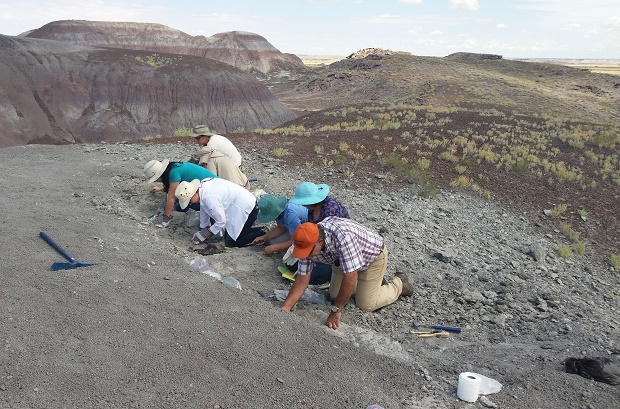 DEL RIO, Texas — A fossil found in limestone along a remote South Texas riverbed could be that of a dolphin-like reptile that swam in oceans 90 million years ago, according to paleontologists.
DEL RIO, Texas — A fossil found in limestone along a remote South Texas riverbed could be that of a dolphin-like reptile that swam in oceans 90 million years ago, according to paleontologists.
The discovery was made two years ago by petroleum geologist James Harcourt, who works for the Texas Railroad Commission, which regulates the state’s oil and gas industry. It went largely unnoticed until a photo of the fossil appeared on the cover of the commission’s 2016 annual report.
The find is unique because it appears to be a nearly complete fossil of an ichthyosaur, which grew to about 6 feet long and had the sleek body of a dolphin and long, toothy jaws of a dinosaur, the Houston Chronicle reports (http://bit.ly/2ilbe3c ).
The fossil was found on private land near the border town of Del Rio as Harcourt and some colleagues were studying the Eagle Ford formation, which is one of the state’s most productive shale oil basins. Harcourt spotted a row of bones imprinted on rock. When the surface dirt was cleared away, Harcourt and his colleagues realized the limestone held a large skull, long spine and ribs.
“Very rarely do we get really complete skeletons out of the Eagle Ford,” said Josh Lively, a doctoral candidate specializing in marine reptile fossils at the University of Texas. “Whenever you have an associated skeleton like this, when you have multiple parts of the animal, it’s a really an important find.”
Ichthyosaurs were disappearing from the seas when the Eagle Ford formed, some 88 million to 96 million years ago. Lively said there’s a chance it could be a plesiosaur, a much larger underwater reptile, and paleontologists won’t know for sure until the bones are exhumed, which can only happen with the property owner’s permission.
Fossils can’t be studied, and their contributions to science can’t be measured, until they are out of the ground, said Matt Brown, the director of vertebrate paleontology collections at UT Austin.
RELATED STORIES






